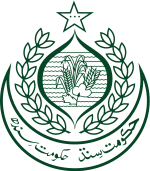
Bangladesh Civil Service, popularly known by its acronym BCS, is the civil service of Bangladesh. Civil service in the Indian subcontinent originated from the Imperial Civil Service which was the elite higher civil service of the British Empire in India during British rule, in the period between 1858 and 1947. After the partition of 1947, East Bengal became a province of Pakistan, and the successor to the Imperial Civil Service in Pakistan was Central Superior Services. After the independence of Bangladesh in 1971, it became known as Bangladesh Civil Service by an ordinance from the then President Sheikh Mujibur Rahman.

Mayor of Karachi is the executive of the Karachi metropolitan corporation and the Karachi local government system of the city of Karachi which is the third tier of governance in Pakistan after Federal and provincial governments.

The Government of Sindh is the provincial government of the province of Sindh, Pakistan. Its powers and structure are set out in the provisions of the 1973 Constitution, in which 30 Districts of 7 Divisions under its authority and jurisdiction.

The Central Superior Services is a permanent elite civil service authority, and the civil service that is responsible for running the bureaucratic operations and government secretariats and directorates of the Cabinet of Pakistan. The Prime Minister is the final authority on all matters regarding the civil service.

The Government of Punjab is the provincial government of the Pakistani province of Punjab. It is based in Lahore, the provincial capital. Its powers and structure are set out in the provisions of the Constitution, in which 41 districts come under its authority and jurisdiction. The government includes the cabinet, selected from members the Punjab Provincial Assembly, and the non-political civil staff within each department. The province is governed by a unicameral legislature with the head of government known as the Chief Minister. The Chief Minister, invariably the leader of a political party represented in the Assembly, selects members of the Cabinet. The Chief Minister and Cabinet are thus responsible for the functioning of government and are entitled to remain in office so long as it maintains the confidence of the elected Assembly. The head of the province is known as the Governor, appointed by the federal government, on behalf of the President, while the administrative boss of the province is Chief Secretary Punjab.
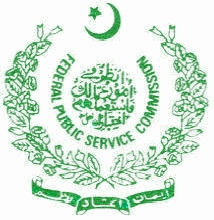
The Federal Public Service Commission(FPSC) (Urdu: فیڈرل پبلک سروس کمیشن) is a federal agency of Government of Pakistan that is responsible for recruiting civil servants and bureaucrats for Government of Pakistan.
Law enforcement in Pakistan is one of the three main components of the criminal justice system of Pakistan, alongside the judiciary and the prisons. The country has a mix of federal, provincial and territorial police forces with both general and specialised functions, but the senior ranks of all the provincial forces and most of the federal ones are manned by members of the Police Service of Pakistan (PSP). The PSP is one of the most prestigious parts of the Central Superior Services, Pakistan's main civil service organisation. Federal law enforcement agencies are generally overseen by the Ministry of Interior of the Government of Pakistan, while provincial police forces are overseen by a department of the government of that province.
The Ministry of Personnel, Public Grievances and Pensions is a ministry of the Government of India in personnel matters specially issues concerning recruitment, training, career development, staff welfare as well as the post-retirement dispensation.

National Commission on Status of Women (NCSW) is a Pakistani statutory body established by the President Pervez Musharraf, under the XXVI Ordinance dated 17 July 2000. It is an outcome of the national and international commitments of the Government of Pakistan like Beijing Declaration and Platform for Action, 1995; and 1998 National Plan of Action (NPA) for Women, 1998.

The Election Commission of Pakistan (ECP) is an independent, autonomous, permanent and constitutionally established federal body responsible for organizing and conducting elections to the national parliament, provincial legislatures, local governments, and the office of president of Pakistan, as well as the delimitation of constituencies and preparation of electoral rolls. As per the principles outlined in the Constitution of Pakistan, the Commission makes such arrangements as needed to ensure that the election is conducted honestly, justly, fairly and in accordance with law, and that corrupt practices are guarded against. The Election Commission was formed on 23 March 1956 and has been restructured and reformed several times throughout the history of Pakistan.

The Sindh Police, is a law enforcement agency established in 1843 under a proclamation issued by Sir Charles Napier, who became the conqueror of the State of Sindh by defeating the forces of the Talpur rulers at the battle of Miyani near Hyderabad on 20 March 1843. Ever since its inception, the organization was raised on the model of the Royal Irish Constabulary to maintain law and order and law enforcement in Sindh, Pakistan. The department serves an area of ~140,914km2 and has about 280,000 police officers and staff to serve in the department. Riffat Mukhtar is the current Inspector-General of Police, appointed in August 2023.
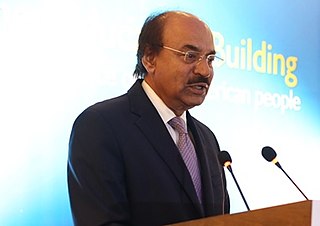
Senator Nisar Ahmad Khuhro is a Pakistani Sindhi politician who has been the member of the Senate of Pakistan since March 2022. He is also the President of Pakistan Peoples Party's Sindh chapter.
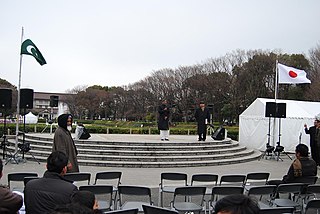
Noor Muhammad Jadmani is a retired officer of Foreign Service of Pakistan, who served at various ambassadorial positions for Pakistan. He also served as Chairman (SPSC) post-retirement for a period of five years; however, the High Court of Sindh has inculpated him for misconduct in the recruitment process during his tenure.

Pakistan Medical and Dental Council is a statutory regulatory authority that maintains the official register of medical practitioners in Pakistan. Its chief function is to establish uniform minimum standards of basic and higher qualifications in medicine and dentistry throughout Pakistan. It also sets the education standards for medical colleges in Pakistan along with the Higher Education Commission.
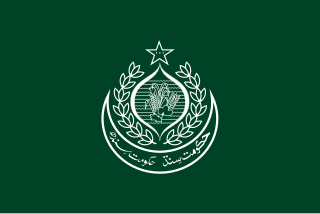
The Commissioner Karachi Division is the top executive of the Karachi Division, overseeing all maters within the Division. The position holder is a Grade-21 or Grade-20 Officer who reports to the Chief Secretary and the Chief Minister. The position is deemed as one of the most important posts in Pakistan.

PS-111 Karachi South-V is a constituency of the Provincial Assembly of Sindh.
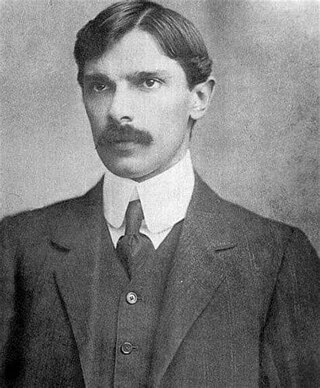
The Sindh assembly was the first British Indian legislature to pass the resolution in favour of Pakistan. Influential Sindhi activists under the supervision of G.M. Syed and other important leaders at the forefront of the

Roads in Pakistan are generally classified as federal, provincial and municipal roads.

Rizwan Ahmed is the current Member of Sindh Public Service Commission and a former grade 22 officer of the Pakistan Administrative Service who served at the highest civil service office of Federal Secretary. He did his two-year Masters in Public Administration from Harvard University and joined the civil service in 1988. Rizwan holds the rare honour of having served as the chief executive of four state-owned companies under the Government of Pakistan. He was promoted to the country's top bureaucratic rank of grade 22 in 2017.
The Administrator Karachi is an Officer in the Pakistan Administrative Services, usually of the elite rank of BS-20.
